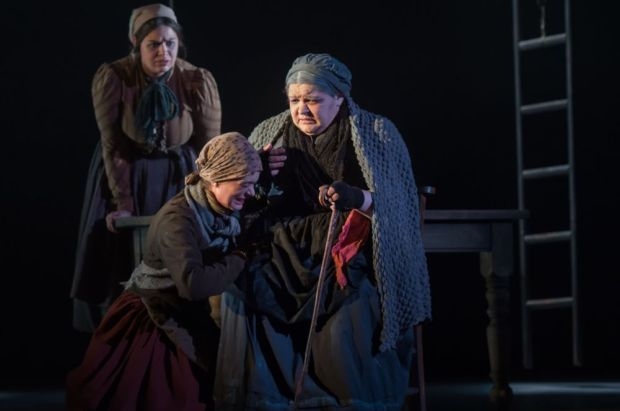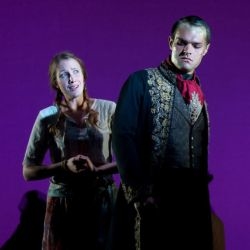Riders to the Sea / Sāvitri (Peacock Theatre)
British Youth Opera revives two neglected operas on a theme of death

© Bill Knight
Maurya, a fisherman's widow, has lost four sons to the sea and a fifth is missing. But death will not be sated until it has claimed every male in her family.
As a threnodist, RVW would shake the soul five years later with the finale to his 'Pastoral' symphony; but in Riders he's a rabbit in the headlights of Synge's play, so fearful of making a false step that he stands still. During lengthy, text-led passages he barely leaves the note he starts from, allowing little by way of dramatic musical development. Individual moments have power — the bereaved mother's cry "My heart is broken from this day" is worthy of Benjamin Britten — but for the most part his music prods the emotions without ever quite breaking the skin, let alone twisting the knife.
All of which makes it the devil of a piece to perform since it's down to the singers to bring it alive. The young professionals of British Youth Opera do wonders. Claire Barnett-Jones meets with aplomb the formidable challenge of singing Maurya, while her daughters are a fine support: not only the radiantly engaged soprano Harriet Eyley as Nora but, equally effectively, the more conventional Josephine Goddard as Cathleen.
'Ideal gravefellows'
Rodula Gaitanou's spare production is all the more effective for not trying too hard. The dead are a constant presence, sewing fishing nets stage right beneath an eerie light (impressive work by David Howe), and Simon Bejer's designs define space through the simplest of means. But the non-musical sound picture is troubling, with far too much volume from the breaking waves and some excessive sobbing at the opera's gloomy end.
It was a good idea to pair Riders to the Sea with Gustav Holst's Sāvitri. Two operas of similar duration, composed by lifelong friends with similar yet distinctive voices and on a shared theme, they make ideal gravefellows. But it's Holst whose opera has the greater optimism. He wrote his Mahabharata-inspired one-acter to his own libretto in 1907, so it's much the earlier of the two.

© Bill Knight
There's a melodic perfume to Sāvitri that's balm after Riders; however its lack of dramatic impetus demands performance skills that are not always apparent here. The story of a woman who outwits Death himself is beautifully rendered by Holst — provided you can hear the text. Sofia Larsson's account of the exacting title role precludes that for much of the time, especially when her voice is under pressure, and with no surtitles you'll need to mug up on the opera beforehand, perhaps through Janet Baker's magical performance in the early Decca recording.
Matt Buswell contributes a Death who's burnished both visually and vocally. His physical presence has been carefully thought through in Gaitanou's direction, even though the candles-and-flowers set he inhabits smacks unduly of Glyndebourne's Saul. And there's good work from tenor Adam Temple-Smith in the smaller role of Satyavān, the heroine's husband who spends most of the opera dead.
A terrific female chorus graces both operas and Geoffrey Paterson conducts the Southbank Sinfonia with his accustomed panache, making light of the Peacock Theatre's dry acoustic.
There are further performances of Riders to the Sea and Sāvitri on 12 September













